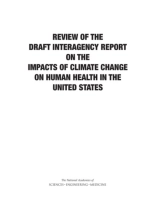The U.S. National Climate Assessment identified a number of ways in which climate change is affecting, and is likely to affect, people, infrastructure, natural resources, and ecosystems. Those impacts, in turn, are increasingly having important current and potential future consequences for human health. There is a need to probe more deeply into how climate change impacts on the environment can create environmental stressors that, in turn, are having and/or have the potential to have significant impact on human health in a number of dimensions. In response to this need, the U.S. Global Change Research Program (USGCRP) has initiated an interagency Scientific Assessment on the Impacts of Climate Change on Human Health in the United States. The Assessment is intended to inform public health authorities, other planning and policy entities, and the general public.Review of the Draft Interagency Report on the Impacts of Climate Change on Human Health in the United States evaluates the scientific basis, findings, and key messages of the USGCRP Draft Assessment. This report offers a number of overarching suggestions on how the USGCRP report authors can enhance their identification and assessment of the science and better communicate their conclusions to all of their target audiences. These recommendations this help the Assessment to play a significant role in continued efforts to examine and explore the impacts of climate change on human health.
Board on Atmospheric Sciences and Climate & Board on Population Health and Public Health Practice
Review of the Draft Interagency Report on the Impacts of Climate Change on Human Health in the United States [PDF ebook]
Review of the Draft Interagency Report on the Impacts of Climate Change on Human Health in the United States [PDF ebook]
Dieses Ebook kaufen – und ein weitere GRATIS erhalten!
Sprache Englisch ● Format PDF ● Seiten 78 ● ISBN 9780309377287 ● Verlag National Academies Press ● Erscheinungsjahr 2015 ● herunterladbar 3 mal ● Währung EUR ● ID 7149933 ● Kopierschutz Adobe DRM
erfordert DRM-fähige Lesetechnologie












